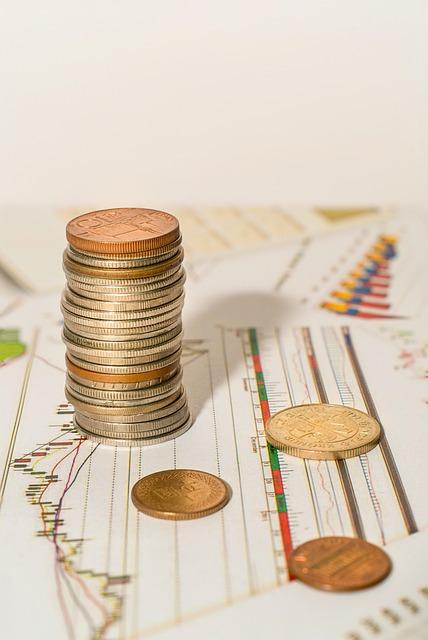So, you’ve heard people throwing around words like GDP, inflation, and interest rates, and it all sounds like a totally different language? Don’t worry, you’re not alone. The economy might seem like this big, scary monster that only experts can understand, but guess what? It’s actually pretty chill once you get the hang of it. Welcome to “Economy 101: A Chill Guide for Total Newbies” – where we break down the basics without the boring jargon, confusing graphs, or snooze-worthy lectures. Whether you want to impress yoru friends, make better money moves, or just finally understand what those news headlines mean, you’re in the right place. let’s dive in and make economics easy (and maybe even a little fun).
What the Heck Is the Economy Anyway and Why Should You Care
Think of the economy as the giant web connecting everything you buy, sell, or use.It’s not some boring, big-shot government thing – it’s literally about how money and resources flow through our daily lives. Whether you’re grabbing coffee, streaming your fave show, or scoring concert tickets, the economy is doing its thing behind the scenes. It’s like the ultimate network that decides how jobs are created, prices change, and why your paycheck might feel thicker or thinner some months. Basically, it’s the game that affects your wallet directly and indirectly.
Why does this matter to you? Because understanding even a little can make you smarter about your own money moves. Here’s what’s going down when the economy shifts:
- Jobs: When the economy’s booming, more jobs pop up – and more cash in pockets.
- Prices: Stuff you buy goes up or down in price based on supply,demand,and money flow.
- Interest: The rates you pay on loans or earn on savings dance to the economy’s tune.
| Economic Factor | What It Means for You |
|---|---|
| Inflation | Prices creep up, so your dollar buys less |
| Unemployment | Fewer jobs if high, more if low |
| GDP Growth | General health check of the economy |
Breaking Down Supply and Demand without the headache
Let’s keep it simple: supply is all about how much of something is available, while demand is about how much people want it. Think of it like this-imagine your town just got a new ice cream truck. If there are tons of cones (high supply) but hardly anyone wants one (low demand), the truck might start giving away free scoops just to get rid of the stock. But if everyone can’t stop talking about how awesome the truck is (high demand) and there are only a few cones left (low supply), prices might go up or you’ll be waiting in the longest line ever.
Here’s a swift peek at how they play together:
| Scenario | Supply | Demand | Result |
|---|---|---|---|
| Too Much Ice Cream | High | Low | Price Drops |
| ice Cream Craze | Low | High | Price Rises |
| Balance is Key | just Right | Just Right | Happy Customers & Fair Prices |
- Supply up + demand down = sellers might get desperate.
- Demand up + supply down = buyers might get competitive.
- Both balanced = smooth sailing for everyone.

Money Talk Made Easy How Currency and Banks Work Their Magic
Think of currency as the ultimate social contract – it’s the shiny ticket everyone agrees has value, letting you swap goods and services without the awkward barter dance.Whether it’s cash in your wallet, numbers on your screen, or that contactless beep at the store, money makes the economy groove. Banks play the role of the behind-the-scenes wizards: they keep your money safe, churn out loans to help people buy homes or start businesses, and even influence how much cash is flowing around by cozying up with central banks.
Here’s the lowdown on the banking magic tricks that keep things moving:
- Deposits: You stash your cash, banks store it securely.
- Loans: Banks lend your money to others, charging interest.
- Reserve Requirement: Banks keep a fraction of deposits handy; the rest goes into lending.
- Money Multiplier: This process means a little deposit can turn into a lot more spending power in the economy.
| Bank Function | What Happens | Why It Matters |
|---|---|---|
| Accepting Deposits | Safeguards your money | Gives you easy access while enabling the bank to lend |
| Issuing Loans | Provides funds to borrowers | Drives economic activity and growth |
| Maintaining Reserves | Keeps a safety buffer | Ensures liquidity and trust |
Why Inflation Freaks Everyone Out and How to Stay Ahead
When prices start climbing, it’s easy to panic because suddenly your money doesn’t stretch as far as it used to. This squeeze on your wallet is what makes inflation feel like an invisible thief sneaking around, stealing your purchasing power bit by bit.The real kicker? Inflation isn’t just about prices going up-it’s about uncertainty. People freak out as they can’t predict what their bills or groceries will cost next month, which makes budgeting feel like trying to hit a moving target in the dark.
But here’s the good news: staying ahead isn’t as complex as it sounds.You can start by protecting your savings from losing value and thinking smart about where you put your money. Here are some chill tips to keep inflation from ruining your vibes:
- Diversify Your Investments: Spread your cash across stocks, bonds, and real assets like property or gold.
- Keep an Eye on Interest Rates: When rates rise, consider high-yield savings accounts or inflation-protected securities.
- Budget with Flexibility: Expect some price bumps and prepare a buffer for essentials.
| Strategy | Why It Works | Quick Tip |
|---|---|---|
| Real Assets | Hold value as prices rise | Think property or commodities |
| Inflation-Protected Bonds | Adjust with inflation | Look for TIPS (in the US) |
| Flexible Budget | Prepares you for surprises | Build a 10% cushion |
Simple Tips to Boost Your Financial Game Without Going Crazy
starting your financial journey doesn’t have to feel like cracking a secret code. Instead of diving into complex formulas or stressing over every dollar, focus on a few key habits that make a big impact. First up, track your spending. Not to micromanage, but to actually see where your money’s going. This simple move highlights sneaky expenses you can cut back on without sacrificing your morning coffee or weekend fun.Another pro move? Automate savings. Setting up a recurring transfer that’s just out of sight helps build your cushion without you thinking twice.
Feeling overwhelmed by all the options? Keep it chill with this quick cheat sheet:
- Budget basics: Use the 50/30/20 rule (50% needs, 30% wants, 20% savings)
- Emergency Fund: Aim for 3-6 months of expenses
- Debt Hack: Pay off high-interest debt first – less stress, more freedom
- Invest Small: Even small amounts add up over time, thanks to compound interest
| Tip | Why It Works |
|---|---|
| Track Spending | Visibility = Control |
| Automate Savings | Saves energy + builds habit |
| Prioritize Debt | Less interest means more cash |
| Start Investing | Money grows while you sleep |
Q&A
Economy 101: A Chill Guide for Total Newbies – Q&A
Q: okay, so what is the economy, anyway?
A: Think of the economy as the big system that decides how money, goods, and services move around. It’s like a giant marketplace where people buy, sell, work, and invest – all that jazz that keeps stuff running.
Q: Why should I even care about the economy?
A: Because the economy impacts your daily life more than you realize. It affects how much your favorite snacks cost, if you can land a job, or even whether your rent goes up. Basically, it’s behind the scenes of your wallet’s mood swings.
Q: What’s GDP? I see that term everywhere and it sounds fancy.
A: GDP stands for Gross Domestic Product, and it’s just a way to measure all the goods and services a country makes in a year. If GDP is up, it usually means the economy’s doing well – more jobs, more money, more action.
Q: Inflation? Sounds scary. What’s the deal?
A: Inflation means prices are going up over time – that $2 coffee you love might start costing $2.50 or more. It’s normal to have some inflation, but too much can make life expensive. Basically, your money buys a bit less than before.
Q: How does unemployment fit into all this?
A: Unemployment is simply when people who want to work can’t find jobs. High unemployment usually points to a struggling economy as fewer people have money to spend.
Q: What’s the stock market, and why do people hype it so much?
A: The stock market is like a place where you can buy tiny pieces of companies (stocks). People hype it because it’s a way to make money grow – or lose money fast, so it’s kind of like the economy’s roller coaster.
Q: Any simple tips for someone who’s just starting to care about economics?
A: Start small. Read news, follow some finance blogs, watch explainers on youtube, and don’t freak out over jargon. Also, get comfy with basic money management – saving and budgeting are your BFFs.Q: Can the economy mess with my everyday life or is it just for big businesses and governments?
A: Totally your everyday life too! When the economy is strong, jobs are available, prices are stable, and people feel confident spending money. When it’s weak, things get tight – wages can stall, prices can jump, and you might hear more “tough times” talk.
Q: What’s a recession? should I be afraid?
A: A recession is when the economy shrinks for a bit – people spend less, companies earn less, and job hunting gets tougher.It’s not fun but also not the end of the world. Economies bounce back, so think of it like a timeout to catch breath.Q: Last question: where do I go from here if I wanna learn more?
A: Keep it chill-follow blogs like this one, check out easy-to-digest podcasts, or watch videos from creators who make economics fun. The more you know, the less mysterious it gets, and the better you’ll handle money moves in your life.
Hope this Q&A just made economics a little less intimidating. Stay curious and keep it chill!
Final Thoughts
And that’s a wrap on our super chill crash course in economy basics! Remember, you don’t have to be a Wall Street wizard to understand how money flows or why prices go up and down. It’s all about getting comfy with the little pieces that make up the big money puzzle. So next time someone throws around economic jargon, you’ll be ready to nod knowingly (or even throw in your own two cents). Keep it casual, stay curious, and hey – the economy doesn’t have to be scary. You’ve got this! Catch you in the next post! ✌️











